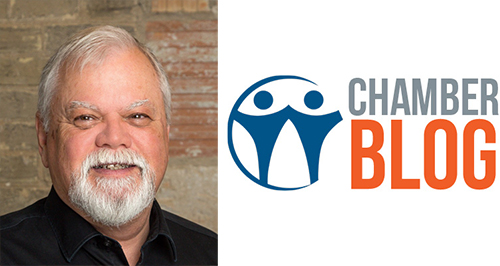Chamber News
Being A Mentor

I was asked recently to provide some feedback on my experiences of being a mentor and given where I am in my working life’s journey it makes sense to reflect on the past and share what I may have learned. In general, mentoring has been very rewarding for me and contributed to my personal growth.
Last week I read an article that said “Between 2010 and 2015 Sun Microsystems studied the career progress of over 1,000 employees. People who had acted as mentors were SIX TIMES more likely to be promoted than those who didn’t, and 20% more likely to get a raise.” Since I have mentored co-workers for over 20 years and in that time received lots of raises and promotions, I’d have to say that my personal experience supports these findings.
My Experience as a Mentor
In hindsight, I think the basis for this is that mentoring teaches you advanced leadership skills. You learn to lead by suggestions, questions, goal setting, support and positive reinforcement. Post secondary education provides exposure to these concepts but I really learned them by doing… by mentoring folks in the workplace.
It was also personally rewarding in other ways. You may convince yourself and others that you might be doing this for raises and promotions, but once you become a mentor the ‘feel good’ factor takes hold and you realize that there is very little more rewarding than knowing you are making a difference to someone else’s life.
Often mentors end up working with younger mentees and this has been my experience to a large degree. Recognizing that different generations think and act differently, a leader needs to have an understanding of how younger generations see things and where they can make a difference. Mentoring offers a unique insight into these generational differences, which I have adapted and use in my own multi-generational workforce at SMARTDESK.
The Mentorship Organization at Whitby Chamber of Commerce
When the Chamber CEO Natalie Prychitko started to consider a mentoring committee for members, I immediately volunteered. I thought that in this way I could reach an even greater number of people by promoting mentorship to both mentors and mentees and based on my personal experience I was convinced that a great number of mentoring opportunities existed than there were available mentors. This soon proved to be the case.
When the committee was constituted, there were a lot of activities to get started, including developing a guide for mentors and mentees, developing a process of application, approval and matching mentors and mentees, and finally developing a process of monitoring and feedback for continuing improvement. There were lots of examples already in use around the globe so we were able to take advantage of the best in class for our purposes. All committee members being experienced mentors, we had no shortage of experience for selecting what would be the most effective and completing the process tasks.
Then with an ‘offering’ ready for use, we developed a ‘go-to-market’ campaign soliciting both mentors and mentees. We were ready for launch.
Initial ‘take-up’ rates were slow but with tenacity, the program began to take shape, with mentoring partnerships and program improvements progressing.
Working in any committee has its challenges and rewards. The kinds of people who come to committee work are usually confident, experienced and well-informed. Static and conflicts may easily arise with so many strong egos involved. This was not the case in the Mentorship Committee. In part this was the selection genius of Natalie Prychinko, who brought together Christina Barrow, Jeff Bakker and myself to become the core of the committee. The collective respect between the members and the feeling that we were embarking on an extremely worthwhile adventure made the work fun, rewarding and very successful.
The committee members collectively believe in the value of being a mentor. After building your own career and expertise you now have a chance to pass on this knowledge. Your experiences can help mentees make better informed decisions on their own careers. Mentees carry on the good ideas you’ve gleaned from your years of working in an industry.
Click here for complete details on the Whitby Chamber of Commerce’s new mentorship program.
– Robert Killin is President & CEIO for SmartDeskCRM Inc.
